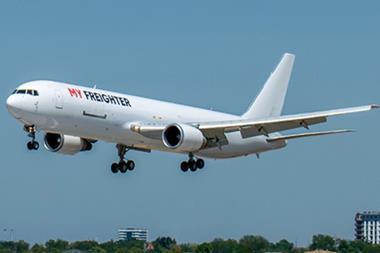Atlas Air Worldwide has seen its revenues breach the $1bn mark for the first time in the company's history.
During the third quarter, the lessor saw its revenues increase by 25.5% year on year to just over $1bn, while adjusted ebitda climbed 42.9% on last year to $280.5m and net income was up 61.4% to $119.5m.
The improvement is down to a 25.8% increase in revenues per block hour to $10,943, while total block hours were down slightly on last year at 90,963.
The higher average rate per block hour was primarily due to an increased proportion of higher-yielding flying, including the impact of new and extended long-term contracts, the ongoing reduction of available cargo capacity in the market, the continued disruption of global supply chains due to the pandemic, as well as higher fuel costs.
During the period, the company also finalised a new contract with its pilots.
“We delivered outstanding financial and operating results in the third quarter. We flew over 90,000block hours and generated quarterly revenue that exceeded $1bn for the first time in our company’s history,” said Atlas Air Worldwide president and chief executive John Dietrich
"In a very challenging pandemic operating environment, our team pulled together to increase utilization of our aircraft, and safely serve our customers and the global supply chain.
“We recently announced long-term contract extensions for 20 aircraft with DHL Express as well as a new long-term ACMI agreement with FedEx.
"We have also extended or entered into other new long-term agreements with additional strategic customers."
Looking ahead, the company is expecting the strong market conditions to continue due to issues in ocean shipping, strong demand and the loss of bellyhold cargo capacity.
"We are operating in a very strong airfreight market, and we expect industry conditions to remain favorable for the foreseeable future," said Dietrich.
"Global airfreight volumes continue to exceed pre-pandemic levels, while industry capacity, particularly on long-haul international routes, has not kept pace with demand.
"Supply chain bottlenecks, including the widely reported challenges at ocean ports worldwide, are driving increased modal shift to air as manufacturers, retailers and shippers strive to replenish very low inventory levels, especially ahead of the holiday shopping season.
"This current environment has also led to a structural acceleration of express growth and e-commerce adoption,which will drive both current and longer-term airfreight demand.”
In terms of fleet, in October 2021, Atlas acquired three additional B747-400Fs that it previously leased.
The airline also reached agreement with lessors in May and June 2021 to purchase five of its other B747-400Fs at the end of their existing lease terms, which occur throughout 2022.
As previously announced, the company acquired three existing B747-400Fs between May and August 2021 that were formerly on lease















